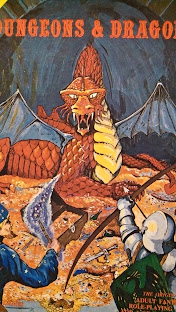
When Gary Gygax died, I considered doing a podcast covering Dungeons and Dragons, but then I got busy and the moment passed.
A year or so later, when Dave Arneson died, I considered the same, but work was eating up all of my time, and again it didn’t happen.
So now, here it is the 40th anniversary of Dungeons and Dragons. And I am once again utterly unprepared with any sort of recording. But despite that, I can’t let this moment go by with notice.
I was introduced to Dungeons and Dragons in 1977. I had loved games up to that point — my family regularly played traditional (i.e. Parker Brothers and Milton Bradley) board games and card games, but nothing beyond that. My mother bought it for me (possibly due to my interest in Tolkien) and introduced me to a new world. I quickly shared it with my friends, and our regular lunchtime games of penny hockey and paper football became dungeon crawlers. We role-played at lunch for years, quickly upgrading to Advanced Dungeons and Dragons, then expanding to other games such as Dragonquest, Runequest, Villains and Vigilantes, Traveller and Top Secret (some of which I’ve covered as podcasts). The friendships I built there carried me through some of the worst of middle school, and through high school.
The new world of games I discovered was broader than role-playing games. In seeking other players and shops that sold D&D modules, I discovered wargames, and some of the hobby games that were becoming more available to the broader public at that time. I slowly became hooked on games in general.
Love of video games was even driven by love of D&D. Just down the street from me, an early form of gaming cafe opened. The owner had bought a set of Apple IIs, and would let people rent floppy discs (for the save files) and come play the games he had available. I, of course, would go play Wizardry for hours on end. The cafe eventually closed, and I, in desperation to play a computer RPG, wrote my own based on the random encounter and room placement tables in the Dungeon Master’s guide (I did, however, rewrite armor class increase in number as it increased in strength, and to absorb damage).
D&D even inspired me to buy my first copy of National Lampoon (scandalous, I know). After school one day, I took a long bus trip to the west side of Buffalo, seeking a small shop which sold crystal dice and various other role-playing paraphernalia. After getting the dice — and come to think of it, my copy of Top Secret — I stopped into a convenience store and saw the Sword and Sorcery issue. Fate, I figured, so I bought it. I still have that magazine, stashed in my Basic D&D box.
I stopped role-playing for the most part after high school, taking it up again briefly with my co-workers when I entered the game industry (Shadowrun and Mage) and continuing up to the point when D&D 3rd Edition came out. But our group petered out and so I returned my dice back to their bags, with only occasional one-off adventures. But as you can see from the above, despite my leaving role-playing, D&D has never really left me.
So what would have that podcast included? Well, the plan was to do a revised history of D&D, covering David Wesely as the originator of proto-roleplaying games, and speculating on the actual contributions of Dave Arneson and Gary Gygax to what eventually got published as D&D. However, since my itch to do that, the book Playing at the World by Jon Peterson has come out. It discusses the early days of miniature wargaming and reportedly has excellent coverage of the history of D&D, with much better documentation than I could have dug up (if you’re not already aware of it, Peterson is also the one pushing January 26th as the publication date of D&D, based on his research). You can also check out his blog, with treatment beyond the book. Fred Hicks, of Evil Hat fame, also has a good history of D&D as well — you can read a portion of it here. So read those books, and whenever you throw the dice, think of Arneson and Gygax, the ones who started it all.
(Oh, and before I go, let me tell you about my character. His name is Manthridor, and he’s a half-elven fighter-mage… wait, come back… I haven’t told you the best part…)
 (Using Hermione’s wand does not make me less of a man)
(Using Hermione’s wand does not make me less of a man) (This is actually scarier than her Halloween costume: She’s wearing eye shadow.)
(This is actually scarier than her Halloween costume: She’s wearing eye shadow.)


